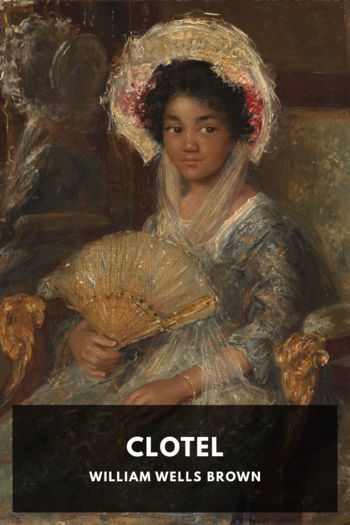Clotel, William Wells Brown [i like reading books .txt] 📗

- Author: William Wells Brown
Book online «Clotel, William Wells Brown [i like reading books .txt] 📗». Author William Wells Brown
The evils consequent on slavery are not lessened by the incoming of one or two rays of light. If the slave only becomes aware of his condition, and conscious of the injustice under which he suffers, if he obtains but a faint idea of these things, he will seize the first opportunity to possess himself of what he conceives to belong to him. The infusion of Anglo-Saxon with African blood has created an insurrectionary feeling among the slaves of America hitherto unknown. Aware of their blood connection with their owners, these mulattoes labour under the sense of their personal and social injuries; and tolerate, if they do not encourage in themselves, low and vindictive passions. On the other hand, the slave owners are aware of their critical position, and are ever watchful, always fearing an outbreak among the slaves.
True, the Free States are equally bound with the Slave States to suppress any insurrectionary movement that may take place among the slaves. The Northern freemen are bound by their constitutional obligations to aid the slaveholder in keeping his slaves in their chains. Yet there are, at the time we write, four millions of bond slaves in the United States. The insurrection to which we now refer was headed by a full-blooded negro, who had been born and brought up a slave. He had heard the twang of the driver’s whip, and saw the warm blood streaming from the negro’s body; he had witnessed the separation of parents and children, and was made aware, by too many proofs, that the slave could expect no justice at the hand of the slave owner. He went by the name of “Nat Turner.” He was a preacher amongst the negroes, and distinguished for his eloquence, respected by the whites, and loved and venerated by the negroes. On the discovery of the plan for the outbreak, Turner fled to the swamps, followed by those who had joined in the insurrection. Here the revolted negroes numbered some hundreds, and for a time bade defiance to their oppressors. The Dismal Swamps cover many thousands of acres of wild land, and a dense forest, with wild animals and insects, such as are unknown in any other part of Virginia. Here runaway negroes usually seek a hiding place, and some have been known to reside here for years. The revolters were joined by one of these. He was a large, tall, full-blooded negro, with a stern and savage countenance; the marks on his face showed that he was from one of the barbarous tribes in Africa, and claimed that country as his native land; his only covering was a girdle around his loins, made of skins of wild beasts which he had killed; his only token of authority among those that he led, was a pair of epaulettes made from the tail of a fox, and tied to his shoulder by a cord. Brought from the coast of Africa when only fifteen years of age to the island of Cuba, he was smuggled from thence into Virginia. He had been two years in the swamps, and considered it his future home. He had met a negro woman who was also a runaway; and, after the fashion of his native land, had gone through the process of oiling her as the marriage ceremony. They had built a cave on a rising mound in the swamp; this was their home. His name was Picquilo. His only weapon was a sword, made from the blade of a scythe, which he had stolen from a neighbouring plantation. His dress, his character, his manners, his mode of fighting, were all in keeping with the early training he had received in the land of his birth. He moved about with the activity of a cat, and neither the thickness of the trees, nor the depth of the water could stop him. He was a bold, turbulent spirit; and from revenge imbrued his hands in the blood of all the whites he could meet. Hunger, thirst, fatigue, and loss of sleep he seemed made to endure as if by peculiarity of constitution. His air was fierce, his step oblique, his look sanguinary. Such was the character of one of the leaders in the Southampton insurrection. All negroes were arrested who were found beyond their master’s threshhold, and all strange whites watched with a great degree of alacrity.
Such was the position in which Clotel found affairs when she returned to Virginia in search of her Mary. Had not the slaveowners been watchful of strangers, owing to the outbreak, the fugitive could not have escaped the vigilance of the police; for advertisements, announcing her escape and offering a large reward for her arrest, had been received in the city previous to her arrival, and the officers were therefore on the lookout for the runaway slave. It was on the third day, as the quadroon was seated in her room at the inn, still in the disguise of a gentleman, that two of the city officers entered the room, and informed her that they were authorised to examine all strangers, to assure the authorities that they were not in league with the revolted negroes. With trembling heart the fugitive handed the key of her trunk to the officers. To their surprise, they found nothing but woman’s apparel in the box, which raised their curiosity, and caused a further investigation that resulted in the arrest of Clotel as a fugitive slave. She was immediately conveyed to prison, there to





Comments (0)